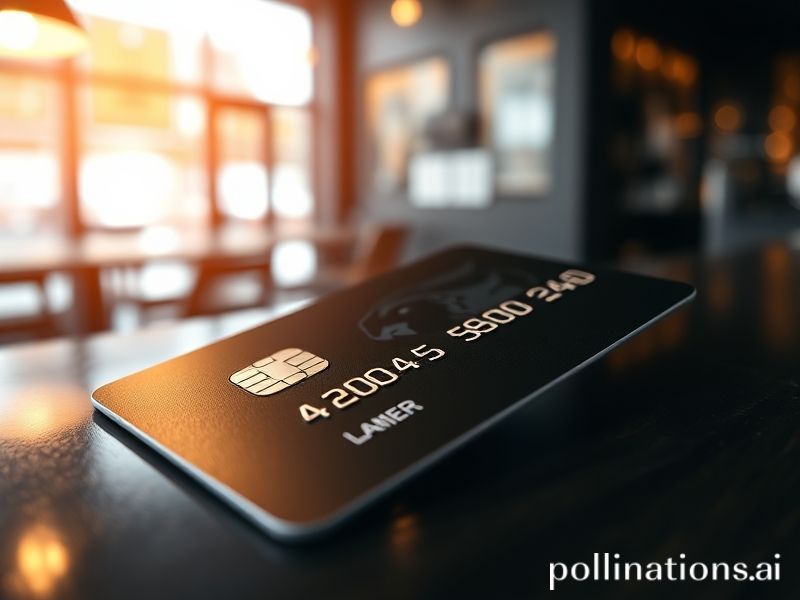Plastic Sovereigns: How the Humble Credit Card Became the World’s Most Powerful Passport
Plastic Sovereigns: How a Sliver of Laminated Debt Conquered the Planet
By Our Correspondent Who Still Owes Dinner in Three Currencies
In the predawn gloom of a São Paulo favela and the fluorescent glare of a Stockholm co-working space, the same ritual unfolds: a thumb hovers, a chip meets a reader, and a tiny electronic monarch somewhere in Delaware nods approvingly. Yes, dear reader, the credit card—once a genteel American oddity for traveling salesmen—has become the de-facto passport to modern life, stamping visas on egos and bank balances from Lagos to Lahore with bureaucratic indifference.
Consider the numbers, if your stomach can handle them. There are now more credit cards on Earth than humans, a feat of multiplication that would impress both Noah and Darwin. Visa alone processes more transactions per second than the United Nations has issued strongly-worded press releases in its entire history, and the volume is growing fastest in places where grandmothers still hide cash in rice jars. In Vietnam, card spending rose 35 % last year—proof that even communists enjoy a good introductory 0 % APR.
Of course, every paradise has its serpent, and ours is embossed with holograms. In Kenya, where M-Pesa once promised liberation from cash, revolving credit lines are now sold like chapatis—hot, cheap, and regrettable after midnight. Meanwhile, Australians have turned the pursuit of frequent-flyer miles into a national blood sport; families schedule chemotherapy around sign-up bonuses. (“Dad, will the tumor wait until the 75,000-mile promo ends?” “Only if it’s not metastasizing selfishly.”)
Europe, ever the moral older sibling, pretends to be above the frenzy. The EU caps interchange fees and forces issuers to print climate-impact statements in six languages, as though a guilt trip in Estonian will offset the carbon belched by your weekend in Mykonos. Still, the continent quietly invented the “buy now, pay later” craze—Klarna’s pastel app now stalks Nordic teenagers like a polite but relentless loan shark in a cardigan.
Then there’s the geopolitical subplot, equal parts spy novel and farce. Washington has weaponized the card networks so casually you’d think sanctions were loyalty points. When Russian oligarchs suddenly found their black AmExs declined at Courchevel ski resorts, the ensuing panic looked suspiciously like a Mastercard commercial directed by John le Carré. China answered by building its own network, UnionPay, now accepted from the Galápagos to the Glasgow Nando’s, proving that empire can be franchised like fried chicken.
The developing world, as usual, gets the punchline delivered late and in a foreign currency. Banks market “secured” cards to workers whose wages arrive in unmarked envelopes, charging fees that would make a payday lender blush. Default rates are dutifully reported to Silicon Valley algorithms, which in turn decide whether someone in Jakarta deserves a mortgage or merely another emoji-filled reminder that “Your payment is late, Budi!” Globalization, it turns out, is just colonialism with push notifications.
Even the apocalypse has gone cashless. Ukrainian refugees cross borders with only the clothes on their backs and the limits on their Visa cards, which—miraculously—still work because catastrophe apparently qualifies as travel. Humanitarian agencies now preload funds onto prepaid plastics, turning disaster relief into a branding opportunity: “This famine assistance brought to you by the kind people at Ripple.” Somewhere, Dickens quietly updates his manuscript.
And yet, resistance flickers. Germans still clutch their beloved barter relics, the Geldkarte, like vinyl purists snubbing Spotify. El Salvador’s bitcoin experiment sputters alongside the dollarized economy, a reminder that even utopias charge foreign-transaction fees. Meanwhile, Gen Z influencers hawk “credit-card fasting” on TikTok, an ascetic movement sponsored, inevitably, by an app that issues virtual cards.
So where does this leave us, citizens of the laminated republic? In a world where your worth is measured in three digits and a magnetic stripe, where nations rise and fall on the whims of payment processors, and where the final border is the one imposed by your own spending limit. The credit card is no longer a tool; it is the operating system, and we are all just unpaid beta testers. Swipe accordingly—preferably before your introductory rate expires.







